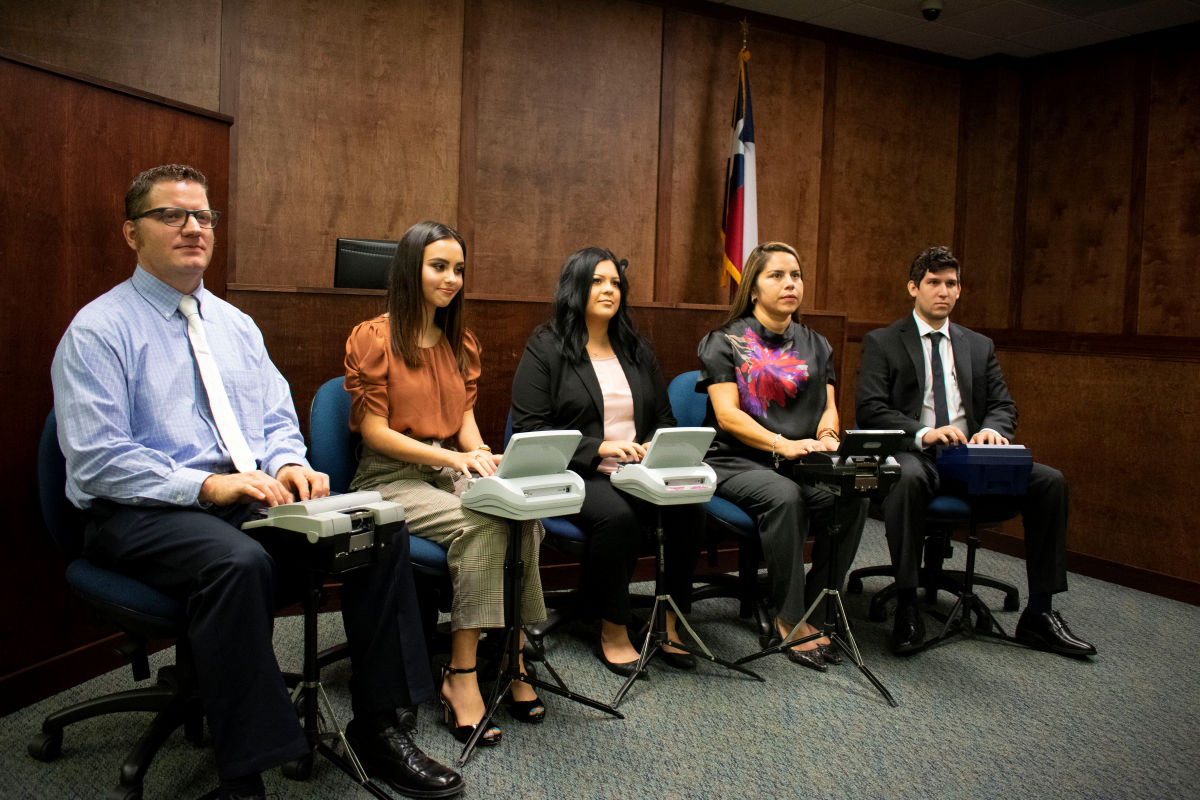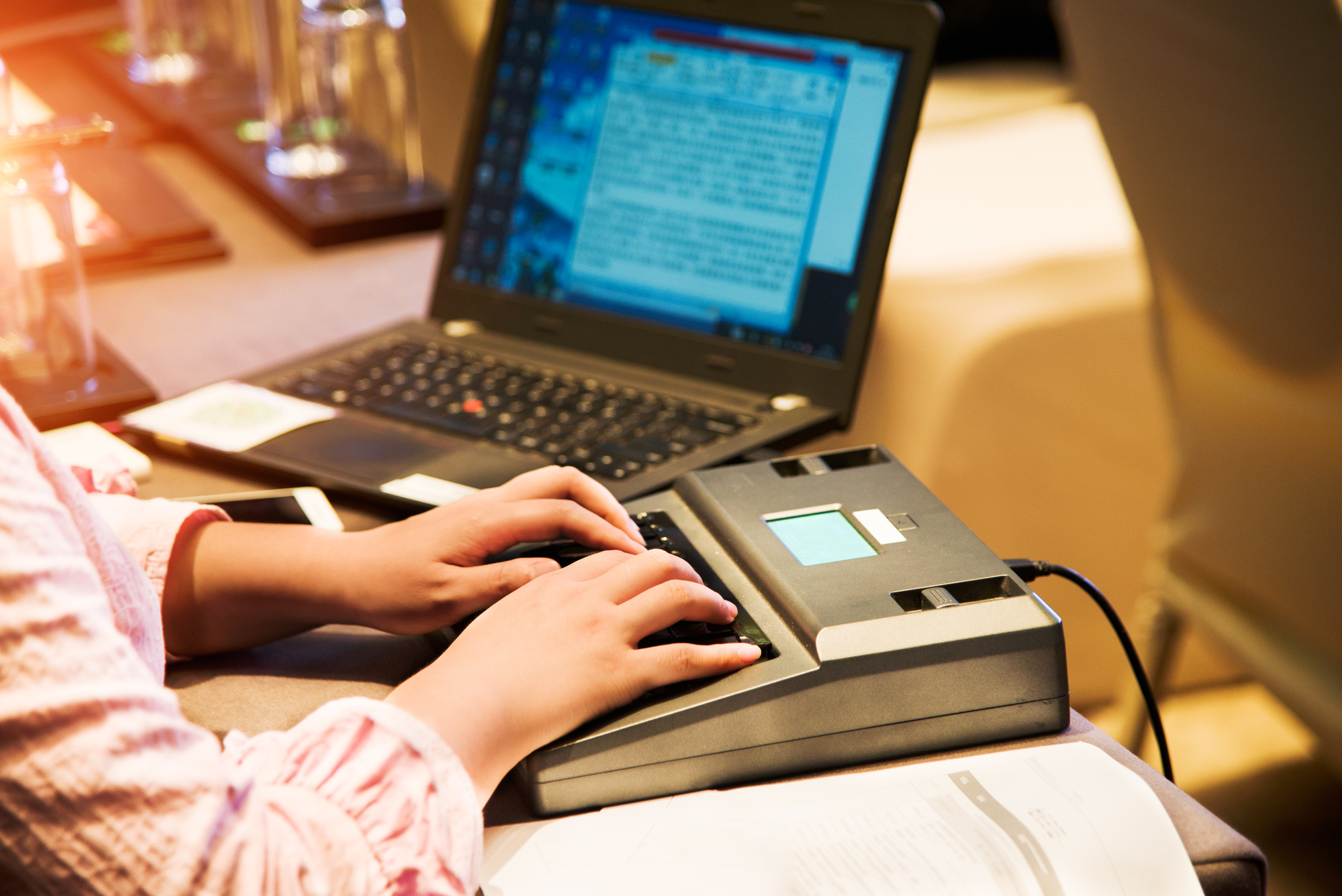Durham court reporting best practices for maintaining confidentiality
Recognizing Court Reporting: An Introduction of Its Function in the Lawful Process
Court reporting is a crucial element of the legal system. It guarantees that every talked word throughout depositions and tests is precisely transcribed. This transcription offers a trustworthy document for future recommendation. Stenotype reporter have specialized skills and have to navigate different innovations. durham court reporting. As the legal landscape evolves, so also does the function of these experts. Comprehending their impact elevates vital inquiries about the future of lawful paperwork and responsibility
The Importance of Accurate Transcription in Lawful Procedures

Exact transcription plays a necessary function in lawful proceedings, offering as the foundation for justice and liability. Court reporters, entrusted with capturing talked discussion during trials and depositions, guarantee that every word is recorded with precision. This transcription ends up being a crucial document, allowing juries, courts, and lawyers to review the process precisely. Errors or noninclusions in transcription can result in misconceptions, false impressions, and potentially unfair outcomes.
Moreover, these transcripts work as official documents that can be referenced in future lawsuits, charms, or academic evaluations. The honesty of the judicial procedure relies heavily on the dependability of these papers. The capacity to present a clear, verbatim account of debates and testimonies is indispensable in maintaining the policy of regulation. The importance of precise transcription can not be overstated; it is vital for ensuring fair trials and preserving public count on in the legal system.
The Abilities and Certifications of Court Reporters
While the function of a court press reporter is essential in the legal system, it requires a special collection of skills and qualifications to ensure efficient efficiency. Efficiency in shorthand or voice writing is needed, allowing reporters to catch spoken language accurately and efficiently. Additionally, a solid grip of lawful terms and treatments is crucial, as stenotype reporter have to understand complicated conversations that take place during hearings and trials.
Additionally, attention to detail and phenomenal paying attention abilities are necessary to assure precise transcripts. Several court press reporters possess qualification from recognized programs, which commonly include strenuous training in transcription techniques and lawful ethics. Solid interpersonal abilities also play a substantial duty, as press reporters frequently engage with attorneys, witnesses, and courts. Inevitably, the combination of technological effectiveness, legal expertise, and interpersonal capabilities outfits court reporters to meet their responsibilities properly within the judicial system
Different Types of Court Reporting Providers
Court reporting services include a selection of specific features customized to meet the requirements of the lawful system. One popular kind is deposition reporting, where stenotype reporter record witness testimonies outside of court setups, often for use in trials. An additional solution is real-time reporting, which provides instant transcription during procedures, enabling attorneys to access online message feeds. In addition, some court reporters use transcription of sound and video clip recordings, guaranteeing precise paperwork of occasions.
Shut captioning solutions are likewise supplied, making lawful proceedings accessible to individuals with hearing problems. Additionally, many court reporting firms specialize in serving particular legal fields, such as family law, criminal legislation, or corporate law, thus providing customized expertise. Finally, some reporters might supply video deposition services, which boost the documents procedure with visual context. Each kind of service plays a necessary function in making sure the accuracy and honesty of legal records.
The Modern Technology Behind Modern Court Reporting
Modern court reporting depends heavily on innovative innovation to enhance precision and effectiveness. Stenography machines, electronic recording methods, and real-time transcription software are integral elements of this field. These devices not only promote the transcription process yet likewise assure that lawful proceedings are recorded with accuracy.
Stenography Machines Explained
Stenography devices function as the foundation of contemporary court reporting, transforming spoken words into created text with remarkable effectiveness. These specialized devices use an unique key-board format that enables stenotype reporter to type syllables and words phonetically, allowing them to catch discussion at high speeds. Making use of shorthand icons implies that press reporters can record conversations in actual time, ensuring exact documents of legal process. Stenography machines are furnished with innovative technology, consisting of software program that can equate stenographic notes into understandable message. This combination of equipment and software application greatly improves the rate and accuracy of court reporting, making it an indispensable device in the legal field. Therefore, stenography continues to be a vital ability for specialists in the court.
Digital Recording Techniques
Innovations in technology have expanded the tools readily available for court reporting beyond standard stenography equipments. Digital recording techniques have emerged as a trustworthy choice, recording sound and video clip of lawful process with high fidelity. These systems use microphones and taping tools purposefully positioned to assure quality and decrease history sound, supplying a detailed document of conversations and statements. The taped material can be repeated for accuracy during transcription, allowing court press reporters to validate information effectively. Furthermore, digital recordings can be stored firmly for future referral, improving ease of access and protecting the integrity of the lawful procedure. As courts accept these modern innovations, electronic recording methods play a progressively essential duty in preserving reliable and accurate paperwork.
Real-Time Transcription Software Program
As court rooms increasingly embrace technology to boost the lawful process, real-time transcription software program has ended up being a vital tool for court press reporters. This innovative modern technology allows stenotype reporter to transcribe spoken discussion quickly, giving instant accessibility to accurate documents throughout proceedings. By transforming spoken words right into text as they are spoken, real-time transcription software program helps with reliable communication in between attorneys, judges, and various other court participants. The software program frequently incorporates with courtroom stereo, making sure that every word is captured with precision. In addition, it can produce records for review and distribution, enhancing the documents procedure. As an outcome, real-time transcription software program not just improves the efficiency of court reporting but also boosts the total access of lawful process.
The Role of Court Reporters in Maintaining Court Stability

Moreover, stenotype reporter add to the transparency of the judicial procedure. By delivering comprehensive transcripts, they enable the general public and media to access court proceedings, fostering accountability. Their visibility in the court room likewise helps maintain etiquette, as their activities highlight the seriousness of the lawful process.
Along with technical abilities, court reporters should exhibit professionalism and reliability and impartiality, vital for protecting the integrity of the judicial system. Inevitably, their thorough company website efforts support reasonable trial legal rights and strengthen public confidence in the lawful framework.
The Future of Court Reporting in an Evolving Legal Landscape
As the lawful landscape develops, court reporting faces substantial modifications driven by technical improvements and a growing change towards remote solutions. These advancements are improving exactly how court reporters operate, affecting both the speed and accuracy of lawful documentation. The future of this occupation will likely pivot on its versatility to these emerging patterns.
Technical Improvements Impacting Reporting
Many technical developments are improving the landscape of court reporting, ushering in a brand-new era of efficiency and accuracy. Digital recording systems have actually become commonplace, enabling for specific audio capture during procedures. These systems often integrate with transcription software, promoting faster turnaround times for records. Additionally, fabricated intelligence is playing a considerable function in simplifying the transcription process, with speech recognition innovation aiding reporters in producing a lot like it more exact documentation. Additionally, cloud-based storage options boost accessibility, enabling attorneys to get and share records conveniently. As these developments remain to progress, they guarantee to additional change the court reporting profession, enhancing the overall legal procedure while keeping high standards of expertise and integrity.
Shift Towards Remote Services
The lawful landscape is progressively embracing remote services, reshaping exactly how court reporting is conducted. This shift has been sped up by technological developments and the necessity for flexibility throughout current worldwide events. Stenotype reporter currently use video conferencing platforms to promote hearings and depositions, enabling higher ease of access and efficiency. Remote solutions allow participation from numerous places, decreasing travel prices and logistical difficulties. In addition, digital transcription devices improve accuracy and simplify the documentation process. As the legal industry adapts, court press reporters are needed to create brand-new skills and familiarize themselves with arising technologies. This advancement provides both chances and challenges, pushing the career towards an extra integrated, technology-driven future while retaining its core dedication to delivering exact and trustworthy legal documents.

Frequently Asked Inquiries
Exactly How Much Do Court Reporters Generally Gain Every Year?
Court reporters commonly make between $50,000 and $100,000 every year, depending on experience, area, and the demand for solutions. Specialized qualifications or skills can better increase their earning capacity in numerous legal settings.
What Is the Ordinary Period of Court Reporting Training Programs?
Court reporting training programs usually last in between 18 months to 2 years. This address duration varies based upon the establishment and the specific curriculum, incorporating both concept and practical abilities crucial for aspiring stenotype reporter.
Can Court Reporters Job From Another Location for Legal Proceedings?
Yes, stenotype reporter can function from another location for legal proceedings, using technology to transcribe audio and video feeds. This versatility allows them to supply accurate documentation while maintaining the honesty of the lawful process.
What Is the Difference Between a Court Press Reporter and a Stenographer?
A court press reporter specializes in transcribing lawful proceedings, while a clerk concentrates on shorthand composing for numerous contexts, consisting of meetings and seminars. Both duties entail recording spoken words however vary in their specific applications and environments.
Are Court Reporters Required to Have Qualifications or Licenses?
Yes, stenotype reporter are typically called for to acquire licenses or accreditations. These qualifications assure they have the essential skills and understanding to precisely transcribe legal process, preserving the honesty of the judicial procedure.
Many court press reporters possess certification from certified programs, which frequently include rigorous training in transcription techniques and legal ethics. One prominent type is deposition reporting, where court press reporters record witness statements outside of court settings, often for usage in trials. As court rooms increasingly adopt innovation to enhance the lawful procedure, real-time transcription software program has actually come to be an important tool for court reporters. Yes, court reporters can function remotely for lawful proceedings, making use of technology to record sound and video clip feeds. A court reporter specializes in recording legal proceedings, while a stenographer concentrates on shorthand creating for different contexts, consisting of meetings and conferences.